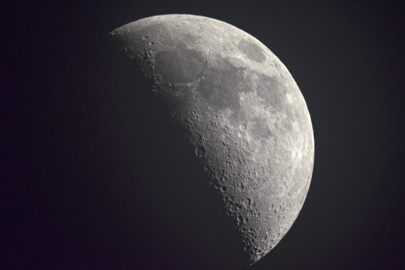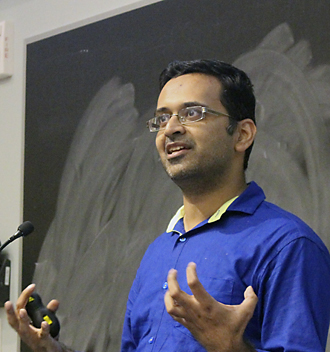Wellington Prize winner aims for the stars
Neuroscience professor Shantanu Jadhav gazes at the heavens with new sharpness thanks to Wellington Prize
 Shantanu Jadhav
Shantanu JadhavShantanu Jadhav is an assistant professor of psychology and neuroscience, studying how the hippocampus and the prefrontal cortex — two critical brain regions — interact and communicate with each other to support learning, memory and decision-making. But as a boy growing up in India, he was a stargazer, developing a passion for looking into the night sky that never left him.
Jadhav has been able to pursue his passion anew, thanks to the mechanical telescope he purchased with the $3,000 award he received as the recipient of this year’s Wellington Prize.
The Wellington Prize is a uniquely Brandesian tradition, established by an anonymous donor in 1993 who wished “to enliven the spirits and delight the sense of assistant professors.” As was specified by the donor, winners are selected through a lottery at the final faculty meeting of the year and can use the award in nearly any way they see fit: one recent winner used it to go on an exhibition to swim with wild dolphins.
The prize money may not be used for purposes of normal scholarly advancement, and winners must present an accurate account of how they made use of the prize over the summer at the first faculty meeting following the use of the funds.
Jadhav presented a report on his use of the prize money at the first faculty meeting of this academic year, saying that what immediately came to mind when he learned he’d won was an assistant professor who had performed an original song as part of her presentation about her use of the prize money.
A touch of performance anxiety hit.
“I couldn’t top that because I have no musical ability whatsoever,” he told the gathered faculty.
But he could share that a third of the world’s population, including 80 percent of Americans and 60 percent of Europeans, can’t typically see the Milky Way because of light pollution. Growing up in a city in a small town near Mumbai, India, he was able to view the Milk Way on nights when periodic blackouts lifted the veil of ambient light. “When I looked in the sky and saw the Milky Way for the first time, it blew me away,” he said.
In an effort to better see the Milky Way near Waltham, where blackouts are far less common, Jadhav spent some time using his telescope on and near Cape Cod over the summer, including a midnight boat trip out of Plymouth to get as far away from light pollution as practically possible.
Inspired by his fascination with the workings of the universe, Jadhav majored in physics as an undergraduate. Ultimately turning to neuroscience may have seemed like a departure, but not exactly. “I remember being filled with wonder at the complexity of the universe, and the complexity of the brain fills me with that same sense of wonder,” he said.
Jadhav also displayed some photographs he was able to take of the moon and of other planets, and gave a plug for the Brandeis Astronomy Club, which he hopes to join. He said he hopes that in a few years his two-year-old son will use the telescope with him and share his love of the night sky.
“This has been a fascination of mine for a long time, and without the Wellington Prize, I don’t think I would ever have acted on it,” he said.
Categories: General





